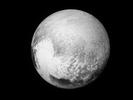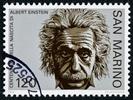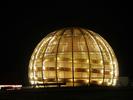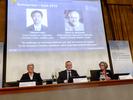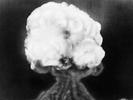Marcelo Gleiser appears in the following:
Choosing Between Good And Evil In A Galaxy Far, Far Away
Wednesday, January 06, 2016
The battle goes on. In a galaxy far, far away, forces of good clash with forces of evil.
The new installment of the Star Wars saga is an absolute success. Rotten Tomatoes estimates a critics' approval of 93 percent. Tickets sales are breaking all records: Star Wars: The Force ...
From Einstein's Ghost To Pluto, A Year Of Remarkable Science
Wednesday, December 30, 2015
It was a busy year for science, with remarkable discoveries on all fronts. I have compiled a brief and incomplete list, biased toward space science and physics, with links to more details. Here it goes:
- Large Hadron Collider (LHC) ends year with a cliffhanger. The behemoth particle collider ...
What The World Looks Like After The Paris Treaty
Wednesday, December 16, 2015
"History will remember this day," U.N. Secretary-General Ban Ki-moon said on Saturday, after almost 200 countries adopted the first global treaty to curb man-made global warming. "The Paris agreement on climate change is a monumental success for the planet and its people."
President Obama agreed: "[The climate agreement] offers the ...
Exploring The 'Universe' In A Video Game
Wednesday, December 09, 2015
Who doesn't want to play God — to have the feeling of creating new worlds with the push of a button? (Although gods presumably don't need buttons to create worlds.)
This is the promise of No Man's Sky, a new game designed by Sean Murray and his team from Hello ...
Should We Eat Golden Rice?
Wednesday, December 02, 2015
Looking at how science has affected humanity, one of the strongest indicators is the dramatic increase in average life expectancy.
During the Late Middle Ages, the average life expectancy in Western Europe was 38 years; in Victorian England, 40. By the early 1900s, with improvements in sanitation, vaccines and treatment ...
The Equation That Blew Up The Cosmos
Wednesday, November 25, 2015
On this very day 100 years ago, while Europe was buried deep in the darkness of the Great War, Albert Einstein wrote down the equation that changed forever the way we understand space, time and matter.
To a large extent, the equation also changed the way we understand ourselves, as ...
Pushing The Frontiers Of High-Energy Physics Links Humanity
Wednesday, November 18, 2015
I spent last week at CERN, the high-energy physics laboratory near Geneva, Switzerland, where the Higgs boson particle was discovered in July 2012.
For those who are not yet familiar, CERN houses a giant particle accelerator — the Large Hadron Collider (LHC) — a machine designed to find ...
The Need To Believe: Where Does It Come From?
Wednesday, November 04, 2015
When discussing the relationship between science and religion, people often take a polarized position: It's either "I believe" or "I don't believe."
Much grief comes from the insistence from either side that the opposite is wrong or meaningless. (Here is an example, as secularist Sam Harris criticizes National Institutes ...
Exploring Catalogues Of Living Creatures And Celestial Objects
Wednesday, October 28, 2015
One of the indisputable advantages of the Internet is accessibility of information, in particular for educational purposes, inside and outside schools.
Vast collections of what we photograph, study and catalogue are available by typing a few words and clicking on a few tabs. For someone who grew up scavenging local ...
Does Technology Make You Freer?
Wednesday, October 21, 2015
The notion that mechanization and technology will bring us free time, so we can "enjoy" life, is as old as technology itself.
The use of farming animals to cut through fields spared humans much hard work. Romans used watermills to grind grain and lift water for irrigation. As we advance ...
What Do You Believe?
Saturday, October 17, 2015
On Sunday, a seven-part documentary series titled Belief begins airing on the Oprah Winfrey Network (OWN). For a week, viewers will travel around the world as the series explores the many facets of belief across cultures, from the orthodox to the secular, from the material to the spiritual.
I ...
Could All Really Come From Nothing?
Thursday, October 15, 2015
The origin of the universe is one of the most difficult realities we ponder.
It bends our logic, straining the words we have to describe it. If one is to say the universe started at the Big Bang some 13.8 billion years ago, the immediate reaction is: "But what came ...
A Short History Of The Mysterious Disappearing Neutrinos
Wednesday, October 07, 2015
We learned Tuesday that Takaaki Kajita, from the Super-Kamiokande Collaboration in Japan, and Arthur McDonald, from the Sudbury Neutrino Observatory Collaboration in Canada (SNO), won the 2015 Nobel Prize in physics for helping to solve a long-standing mystery in physics: the disappearing neutrinos.
Neutrinos are very weird particles. Proposed ...
The Mars Double Attack
Wednesday, September 30, 2015
This is Mars week.
First, we had the mindboggling announcement that there is strong evidence of liquid water flowing on the Martian surface. And, also this week, on Oct. 2, the much-awaited Riddley Scott movie, The Martian -- based on Andy Weir's novel and starring Matt Damon as ...
'The Hidden Code': An Embrace Of Art And Science
Wednesday, September 23, 2015
On Thursday, the Boston Museum of Science will premiere The Hidden Code at the Charles Hayden Planetarium, a multimedia piece by Paul Miller (aka D J Spooky). The piece combines music, stunning visual effects and live readings to bring science to the general public in ways that only a ...
The Immortal Brain: Would You Go For It?
Wednesday, September 16, 2015
Last Saturday, two-time Pulitzer prize winner Amy Harmon published a fascinating article in The New York Times about a young dying woman who chose to have her brain preserved in case neuroscience could one day restore her mind back to life.
Harmon accompanied her article with another one, ...
Moving From Creation Of The Cosmos To Human Life
Wednesday, September 09, 2015
Few questions of our time are more perplexing than the transition from non-living to living matter.
How did a sample of inorganic chemicals self-organize to become a living creature, capable of absorbing energy from the environment and reproducing? Although the question remains open, there are a few things that we ...
Are Science And Truth At Odds?
Wednesday, September 02, 2015
Last week, New York Times science writer George Johnson wrote a very disturbing piece concerning the apparent loss of credibility science is now facing with the public at large.
Creationism, the anti-vaccine movement, resistance to genetically modified crops, cellphone radio waves, fluoridation, the ongoing global climate change debate, the ...
Five 'Scary' Experiments That Did Not Destroy The World
Wednesday, August 26, 2015
Scanning YouTube for popular science videos, I found a jewel — clocking over 10 million views — titled "Five Experiments That Could Have Destroyed The World."
The fact that we are here means these experiments did not succeed on this front. The message, however, is quite clear: We toy ...
Cleaner Cities, Cleaner Planet
Wednesday, August 19, 2015
Growing up in Brazil, I always looked up to America and Europe as standards for how to keep cities clean.
Walking along in New York or Paris, I was struck by how the streets and walkways were garbage-free — at least compared to the streets of Rio and São Paulo. ...


